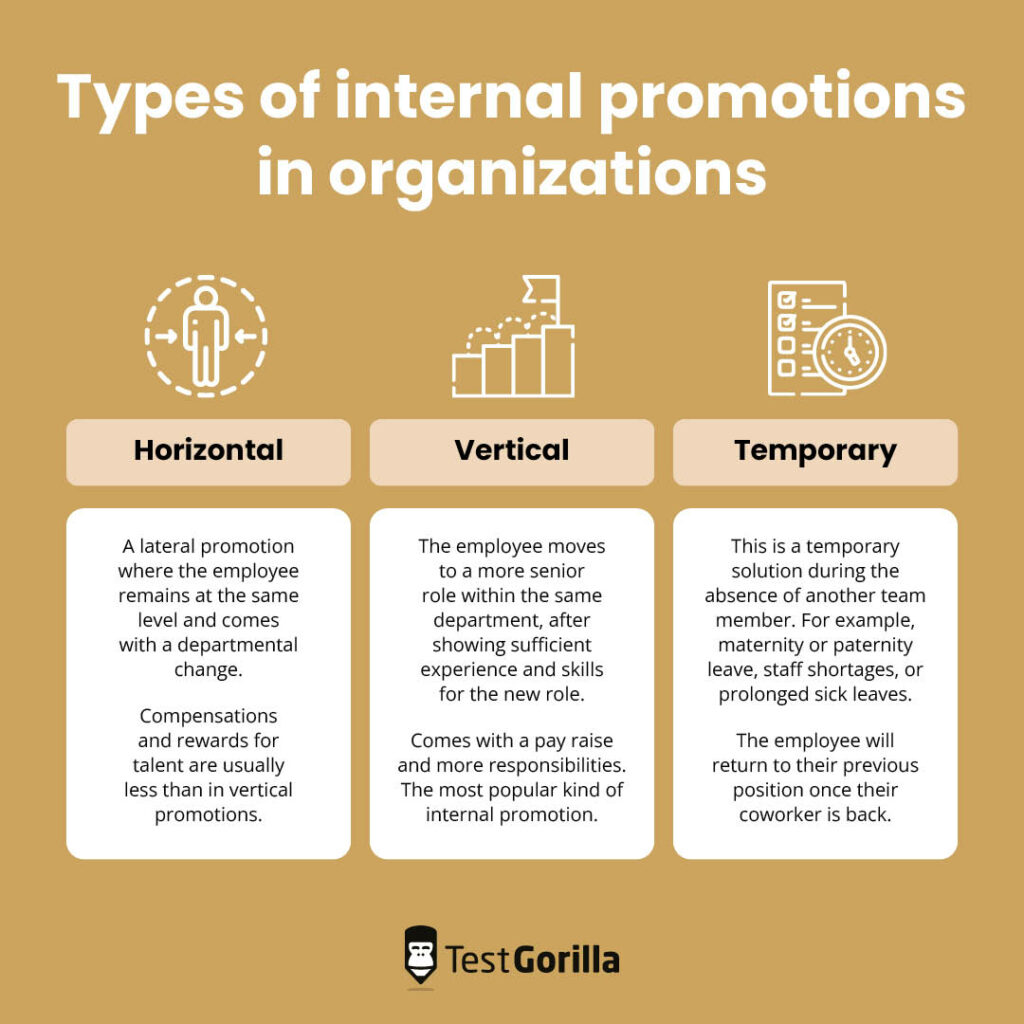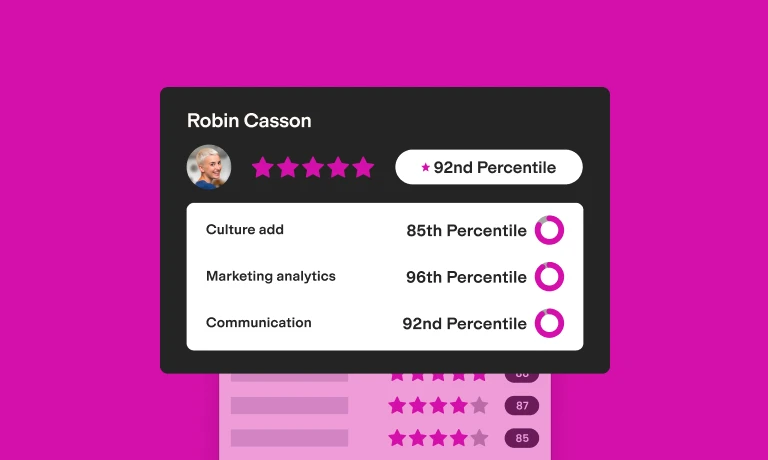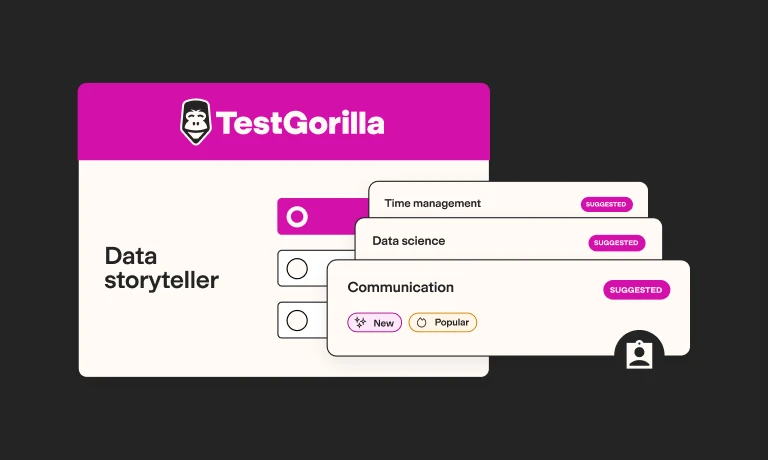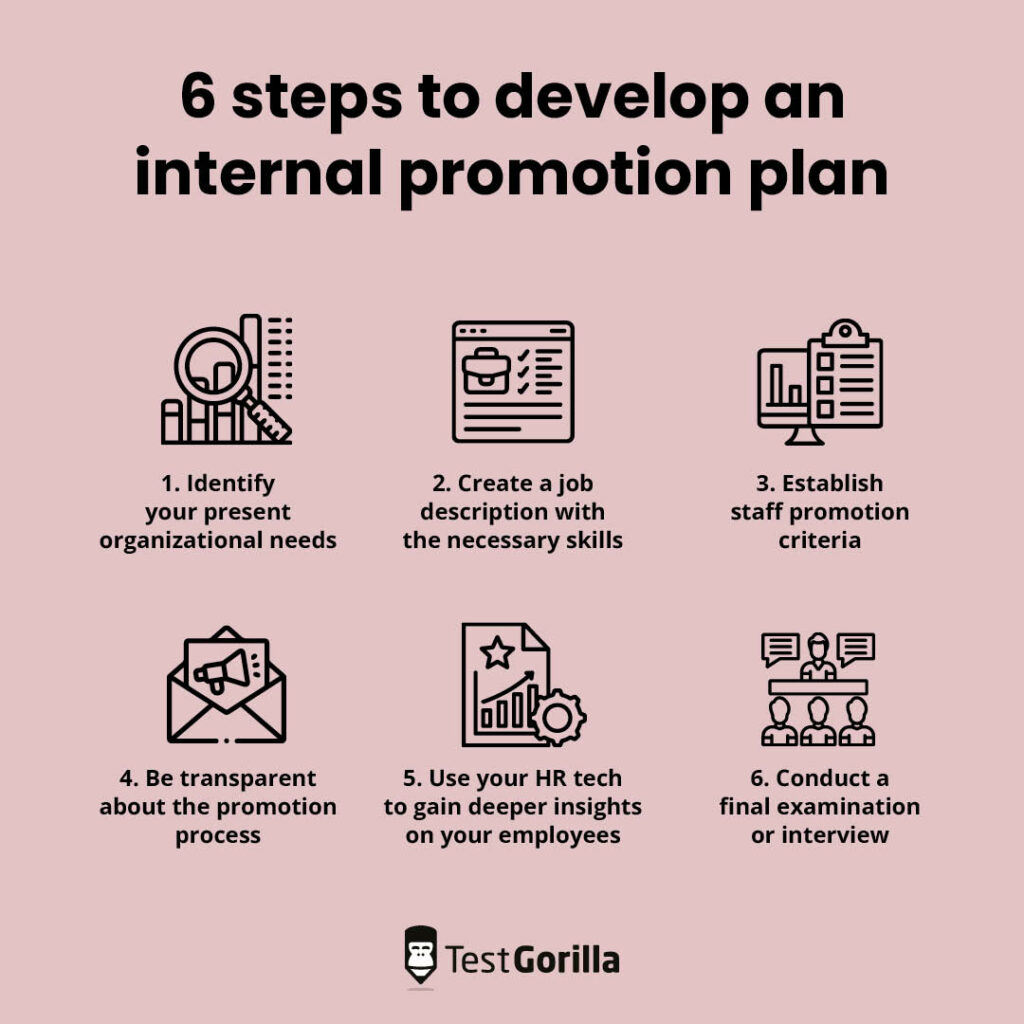Empowering your employees: A blueprint for internal promotion planning
Deciding whether to hire external candidates or promote from within is a question every recruiter faces from time to time. Promoting from within the company often helps create a healthier work culture and a more successful organization.
However, in every business, some amount of employee turnover is expected. So one of the ways to reduce employee turnover is to have a strong internal promotion plan. This makes your employees feel more valued and appreciated.
But how do you decide who to promote? How do you evaluate team members’ skills and performance in the most accurate and objective way possible?
Suppose your criteria for promotion are based on compliance with business ethics or deep expertise in a specific area. Either way, your approach to evaluating employees’ skills is critical to the success of your internal promotion initiatives – and, ultimately, of your organization.
In this article, we’ll explain why an internal promotion plan might be just what you need to empower your employees. We’ll also show you how to set up the right internal promotion scheme to bolster employee motivation.
What is an internal promotion?
Internal promotion is a selection process where you promote existing employees of your organization to new positions. Instead of searching for talent outside your organization, you get to promote team members who have shown they can handle new responsibilities.
Most times, internal performance evaluations help you identify top internal talent. As such, it positively impacts your company enabling you to save money and improve employee motivation and engagement.
What is the importance of internal promotion?
Internal promotion tops the list of ways to inspire and motivate your employees. If you are also looking to create a healthy work environment that fosters employee growth, satisfaction, and enablement, internal promotion can help you achieve that.
Promoting internally is a great way to nurture talent and strengthen your company’s brand and culture. Also, it shows that your company has a fair and transparent promotion policy.
The best insights on HR and recruitment, delivered to your inbox.
Biweekly updates. No spam. Unsubscribe any time.
Types of internal promotions in organizations
In 2022, global spending on hiring external employees was at $25 bn, according to Statista’s Research Department. Hence, as the expenses of getting external recruits continue to rise, internal promotions will give you the financial leverage your business needs to thrive.
To properly practice and maximize internal promotions, you need to know the types of internal promotions available in organizations today. Consider the following:
1. Horizontal promotion
Horizontal promotion entails a promotion where an employee remains on the same level within your organization but moves to a different department. In essence, this kind of internal promotion is lateral and comes with a departmental change.
Here, the responsibilities may not increase but will change due to the change of department. Compensations and rewards for talent are usually less than in vertical promotions.
2. Vertical promotion
Vertical internal promotions are certainly the most popular kind of internal promotion. Here, the employee moves to a more senior role within the same department. Like most promotions, vertical promotions come with a pay raise and more responsibilities.
To be promoted, employees need to show they have gained sufficient experience and skills for the new role.
3. Temporary promotion
In this case, the promotion of an employee is only meant to be a temporary solution during the absence of another team member. It could result from maternity or paternity leave, staff shortages, or prolonged sick leaves, for example.
Since this promotion is just for a period of time, the employee will return to their previous position once their coworker is back.
6 steps to develop an internal promotion plan
The internal recruitment process is similar to a standard external selection process. However, as a recruiter or hiring manager, you must take note of the following to ensure you select the right employee for promotion.
1. Identify your present organizational needs
The first step in creating a successful internal promotion plan is understanding your company’s needs. For example, what kind of talent or skills will the role require? Do you have employees who could comfortably fill these roles?
Answering these questions would enable you to clarify your needs and develop the right blueprint.
2. Create a job description with the necessary skills
Next, you’ll need to create a good job description for the vacancy. On it, you should indicate the essential professional skills, abilities, and expertise the ideal candidate should possess.
A clear job description helps you narrow down what you are looking for and manage your expectations. This way, you’ll be able to spend more time focusing on the best potential candidates rather than on individuals who do not even have the required skills.
3. Establish staff promotion criteria
Sound promotion criteria allow you to create metrics that guide your decision-making process.
For example, let’s say you want a candidate with fantastic leadership and management skills. You should look out for employees who consistently receive excellent feedback from their managers and peers in this field – and you can even use skills tests to confirm their observations.
The key thing to focus on is the consistency with which the employees receive positive feedback. This way, you’ll be sure they’ll deliver consistent quality after the promotion.
4. Be transparent about the promotion process
One thing all healthy workplaces have in common is that they are transparent about their procedures and selection criteria, especially when it comes to recruitment and promotions.
So, to avoid creating a toxic work culture and environment, you must always be transparent.
Showing your commitment to being unbiased and objective by giving clear information on how your HR team and leadership handles internal promotions reassures employees of the possibilities to advance their careers in the future and helps instill trust and confidence.
5. Use your HR tech to gain deeper insights on your employees
A survey by Gartner shows that 58% of companies rely on HR technologies for recruitment. But did you know that you could use your HR tech stack for internal promotions, too?
You can use your HR software to review each employee’s record and analyze talent better, which will enable you to move faster through the internal recruitment process.
Candidate selection should be based on performance, skills, and growth potential to ensure you promote the right person. HR technologies enable you to have full visibility into the performance of your employees.
6. Conduct a final examination or interview
After assessing candidates’ skills and narrowing down your selection to the most promising ones, conduct a final interview with each one of them to see who’s the best fit.
You can use a skills test before the interview to verify the skill level of all contenders for the role. Using the information you gather from such tests would put you in a better position to choose the perfect fit among your employees, as it enables you to be unbiased and objective – which, when you personally know applicants, can be a challenge.
Empower your employees and help them grow with TestGorilla
Every employee’s desire is to progress in their career. Internal promotions facilitate this and give you room to discover skilled talent among your existing staff.
With our detailed step-by-step guide above, you’ll have no problem drafting the blueprint for your internal promotion plan and evaluate your employees’ skills – which is best done with the help of the right skills assessment platform.
TestGorilla is one of the best skills testing platforms out there and it has a plethora of resources and features to help you assess your employees and promote them internally.
To create the perfect internal promotion scheme in your company, select up to five tests to include in an assessment and ask your employees to take it to see who’s the perfect fit.
Get started for free to enhance the career growth of your employees.
You've scrolled this far
Why not try TestGorilla for free, and see what happens when you put skills first.
















